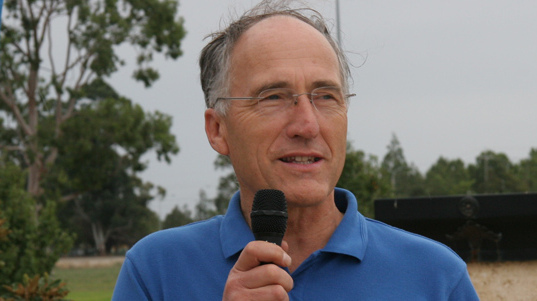
Last week Barnett Government member Peter Abetz attracted criticism for his comments regarding the Safe Schools Coalition program.
The Liberal MLA for Southern Rover argued that the program, which aims to reduce bullying against LGBTI students, was “a gay, lesbian, transgender lifestyle promotion program.”
Abetz reportedly provided a briefing to his Liberal colleagues where he said; “The militant gay lesbian lobby is trying to get this into our schools to ‘normalise’ what they consider the LGBTI agenda.”
The comments were revealed by The West Australian‘s political reporter Gareth Parker.
Speaking on RTRFM’s ‘The Mag’ this morning, Abetz elaborated on his comments. Abetz argued that by focusing on LGBTI issues, the program trivialized other forms of bullying.
“The moment you single out one form of bullying and really focus on that you immediately trivialise the bullying that happens for other reasons and the research that Edith Cowan University did in I think 2009 I think it was published said the biggest cause for bullying in our schools is actually body image; you know, too fat, too skinny, uncoordinated et cetera. That makes up about 45% of bullying in our schools, then you’ve got academic performance, that means too bright, too dumb, that sort of thing, you’ve got race et cetera.” Abetz said.
“By focusing on the LGBTI issue, you’re not actually addressing the bigger bullying program in our schools. I can’t see the school running two or three bullying programs at the same time. That just simply won’t happen. A school uses a bullying program and that’s the program that they use, and I see that as a serious issue here.”
Abetz also repeated he comments he made in an interview with 6PR, when he objected to the program’s recommendation that transgender and non-binary students be allowed to use the bathroom facilities in accordance with their identities.
“They’re actually encouraging schools to allow a boy, for example who is physically male but mentally identifies as female, that such a person should be allowed to wear a girls’ uniform, should be allowed to use the girls’ toilets, should be allowed to change in the girls’ change room and play sport in the girls’ teams.
“Now my children have all grown up but I would be absolutely horrified if a boy who says he identified as female would be using the girls’ toilets when my daughter’s in there or undressing next to my daughter in the sports changerooms. I just think that’s taking it too far.”
Abetz was also asked to clarify on comments made regarding gay, lesbian and transgender identities being a “lifestyle”.
“When I used the word ‘lifestyle’- I’m not sure I should’ve used the word ‘lifestyle’, perhaps I did. What I meant by that was that within society you have different- yeah, like, subsets of people, and they develop their own like, subculture, and I think it’s fair to say that the LGBTI community has its own, yeah, its own language, its own subculture if you like, just like footy people, that are fanatic on footy, in a sense have their subculture about what’s in footy and what goes around that. Perhaps people who are into car-rallying have their own little subculture. So that’s more the sort of thing that I meant by that.” he said.
Abetz also expanded on his previous claims that most people who experience same sex attraction at a young age lose the feelings as they mature.
“Longitudinal studies in a number of different countries have shown that students in their adolescent years, think that- or say that they have same sex attraction or are transgender or whatever, that between 70 and 80 per cent of those young people, by the time they reach their mid-twenties, are absolutely certain at that point, that they are now heterosexual.”
Abetz expressed concerns that by encouraging students to “self-identify”, they will face stigma if they lose those feelings later in life.
“When those feelings disappear, they’re sort of stuck with having identified as that and all of a sudden have to eat humble pie if they’re not after all, and that can cause a lot of anguish and create its own mental health issues.
“Obviously some kids already at a clearly young age are quite set, if you like, in terms of ‘I’m definitely gay’, ‘I’m definitely this’ or whatever, but for a lot of kids it’s foolish, and trying to get them to self identify at that early stage is not helpful.”
Presenter Em Burroughs asked Abetz if creating a school environment that allowed students to express their identities without fear of social recrimination would allow students to change the way they identify later in life without facing stigma. Abetz responded:
“I don’t want to trivialise it by that illustration but if a person is being an Eagles supporter and now switches to the Dockers, he is going a ribbing from his mates, which is actually good fun, but when it comes to your sexuality it’s actually much deeper than that and I think that’s where the difficulty does arise.”
The discussion ended with Abetz stating that all people should be accepted, regardless of what their “issue” is.
“It doesn’t matter what a person’s issue is, whether it’s that they’ve got to wear thick glasses, you know, the old Coke bottle glasses… or whether they are deformed in some way or whatever the issue is, or if they’re very bright or not very bright, they need to be treated with absolute respect and dignity in our society. That’s what we should aspire to. And I think to single out one subset is not helpful.”
Organisations around the country have come to the defense of the Safe Schools Coalition Australia program, including WA organisation GRAI (GLBTI Rights In Aging Inc), who wrote an open letter taking issue with Abetz’ comments that most younger people who identify as homosexual shed those feelings over time.
Sophie Joske
Read More:
16-03-2015 LGBT Advocates Dispute Abetz’ SSCA Claims





